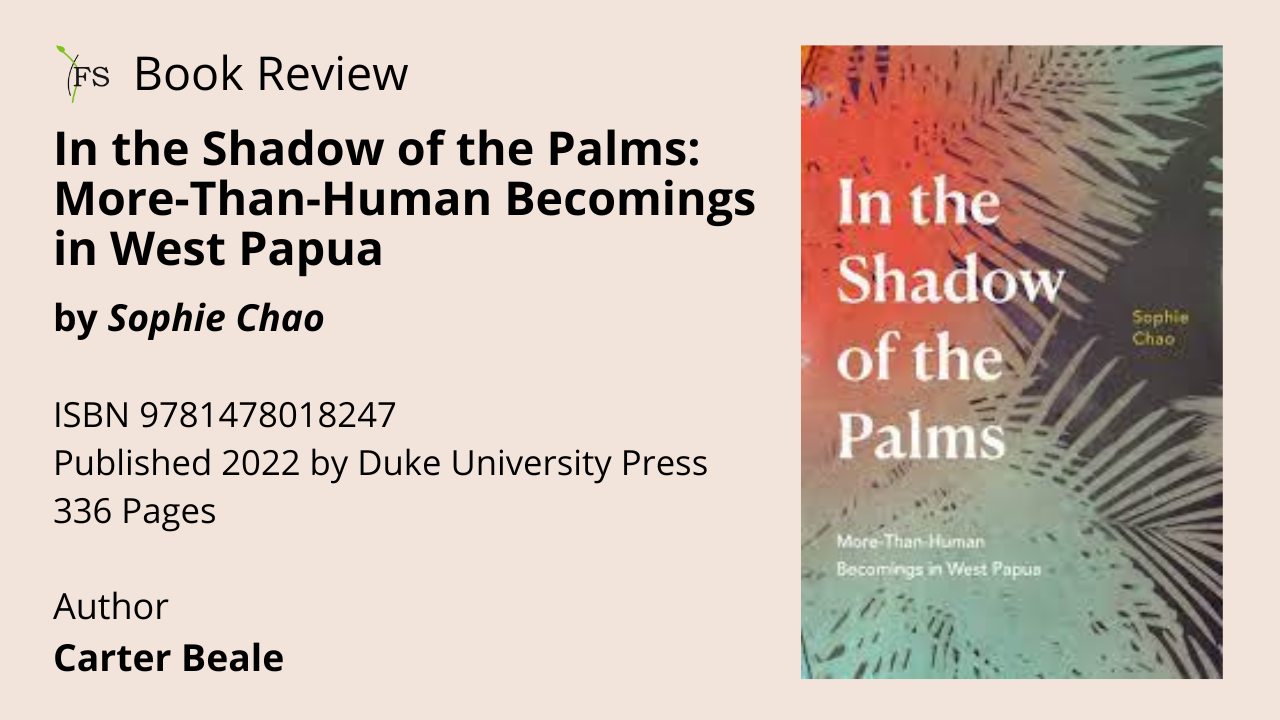Book Review: In the Shadow of the Palms: More-Than-Human Becomings in West Papua. Sophie Chao. Duke University Press, 2022

Additional Files
Deprecated: json_decode(): Passing null to parameter #1 ($json) of type string is deprecated in /home/journal33/public_html/plugins/generic/citations/CitationsPlugin.inc.php on line 49
In the Shadow of the Palms offers a haunting and novel perspective on themes of dispossession and alienation wrought by the expansion of oil palm agribusiness in Indonesia. Drawing on fieldwork with a Marind community in the Upper Bian in West Papua, the text endeavors to describe such dispossessory dynamics from an embodied Marind ontology. Meticulous descriptions of interactions with various animal and plant species evidence a profound intersubjectivity of human and environment in the Marind world. Moreover, these encounters with multi-species entanglements often reveal how the Marind accommodate and assimilate the spiritual and material incursions inflicted by expanding oil palm production. Chao's argument takes issue with recent theoretical trends in multispecies studies for their failure to engage "with Indigenous ontologies and epistemologies, its limited consideration of the "human" category in the context of racializing assemblages, its uncritical celebration of interspecies entanglements, and its insufficient attention to unloving (rather than loved species, and its failure to approach violence itself as a multispecies act)." The evidence Chao provides in the form of thick ethnographic description and songs translations, stories, and dream accounts convincingly complicates the tendency to generalize plant-beings as either benevolent helpers, enigmatic tricksters, or passive, neutral fixtures. The reader is forced to reckon with oil palm as a causal agent implicit in the devastation of forests and rivers fouled by chemical fertilizers and pesticides, and the haunted dreams and bodies of the Marind people.
Chao, S. (2022). In the Shadow of the Palms: More-Than-Human Becomings in West Papua. Duke University Press.
Copyright (c) 2023 Forest and Society

This work is licensed under a Creative Commons Attribution 4.0 International License.
This is an open access journal which means that all contents is freely available without charge to the user or his/her institution. Users are allowed to read, download, copy, distribute, print, search, or link to the full texts of the articles in this journal without asking prior permission from the publisher or the author. This is in accordance with the BOAI definition of open access.
Submission of an article implies that the work described has not been published previously (except in the form of an abstract or as part of a published lecture or academic thesis), that it is not under consideration for publication elsewhere, that its publication is approved by all authors and tacitly or explicitly by the responsible authorities where the work was carried out, and that, if accepted, will not be published elsewhere in the same form, in English or in any other language, without the written consent of the Publisher. An article based on a section from a completed graduate dissertation may be published in Forest and Society, but only if this is allowed by author's(s') university rules. The Editors reserve the right to edit or otherwise alter all contributions, but authors will receive proofs for approval before publication.
Forest and Society operates a CC-BY 4.0 © license for journal papers. Copyright remains with the author, but Forest and Society is licensed to publish the paper, and the author agrees to make the article available with the CC-BY 4.0 license. Reproduction as another journal article in whole or in part would be plagiarism. Forest and Society reserves all rights except those granted in this copyright notice







